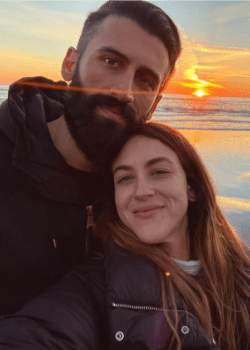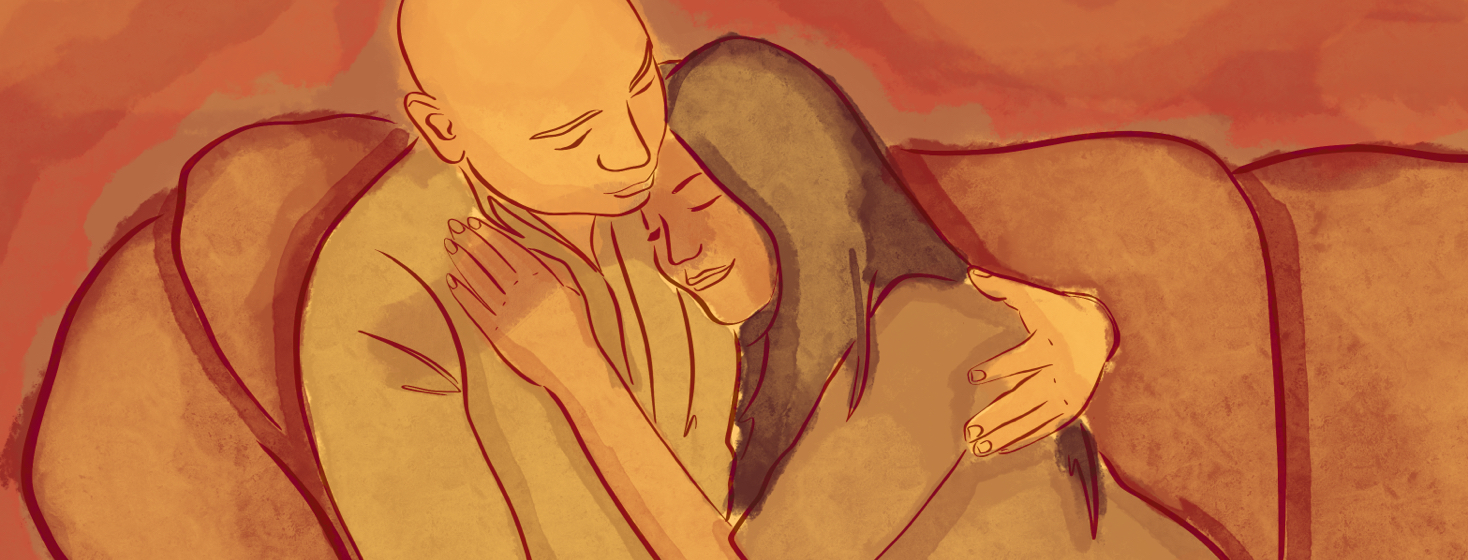The Partner Aspect: TSW Edition
When talking about topical steroid withdrawal, we always feel empathy for the patient - the person experiencing the issue. But what is it like for their partner? It's not a topic we find ourselves pondering because they aren't the ones physically hurting. However, it's one we should definitely acknowledge.
How does TSW affect partners?
Andy, the loving and empathetic fiancé to topical steroid withdrawal advocate Ciena, opens up about how this condition holds a steady place in their relationship - for better and worse.
What is the focus of the relationship?
"First and foremost," he began, "the priority of the relationship becomes centered around one thing: doing anything required to get my partner healthy again." Everything revolves around the partner with TSW. Schedules are made with every intention of keeping them safe and comfortable. Every effort is made to ensure they do not find themselves in scenarios that cause grief, pain, or a dreaded itch attack.
"Whether that means helping her prepare bandages before she sleeps at night, making her food, being a pure listener and letting her express her frustration and sadness, trying to research any health-related modalities to accelerate healing, helping to calm her down while she’s having an itch attack in the middle of the night, etc., anything that will make her feel better or promote healing becomes the focus of the relationship."
That list is nothing short of heroic. Most couples only worry about which Netflix show to watch or whether or not they eat a cheeky bowl of ice cream before bed.
And speaking of the bedroom...
What does intimacy look like?
When absolutely covered in red, patchy skin, and no way of finding respite when hot and sweaty, physical touch goes out the window.
"As a result of this newfound ultra-prioritization of health and recovery," Andy shares, "other aspects of our relationship become more secondary, such as sex. Open wounds and itching and perpetual lack of sleep, amongst other issues, naturally do not help create a passionate/erotic sexual environment."
I remember this all too well. As much as I loved my partner, sex and closeness were out of the question. I could barely stand the clothes on my body, let alone a sweaty body. And it hurt emotionally. No one wants to feel distant from a partner they love. Sex plays a deep role in connecting with your other half, and when it's taken away, the connection is tested.
How does Andy view this obstacle?
But some partners, like Andy, draw from this raw deal. Instead of allowing it to place a wall between him and his fiancé, he sees the lesson in dealing with a partner who has no control over her condition.
"While it is true that TSW definitely tested the strength of our relationship, it has undeniably brought us closer in ways that I find difficult to express with words," he conveys wholeheartedly. "My love for her has somehow deepened, even when I thought I could not love her any more than I already do. I feel more joy and gratefulness for the bare essentials of our relationship, the absolute simplest things like seeing her smile, making her tea, morning cuddles, laughing about the silliest things, walking together, and kissing her just before we sleep."
Now that is true love.
What key element helps maintain a healthy relationship?
"The key element to maintaining our relationship is honest communication."
Whether in TSW or a relationship devoid of any physical illness, this will always be at the top of the list. But in a relationship with chronic illness, it is a lighthouse. Andy expresses that there are moments that call for brutal but gentle honesty in order to make things last.
How do Andy and Ciena maintain open communication?
"We have these 'check-in' type of conversations occasionally, and we are completely forthcoming about everything during these conversations, holding nothing back," he shares. "By doing this, we maintain a level of clarity of where we stand in our relationship, we discuss what we need to work on, what we are grateful for, and so on. This is the key to staying connected with one another."
Without this type of trust and truth, many relationships don't stand a chance. In relationships, especially ones dealing with TSW, there won't always be a 50/50 in responsibilities, but there most definitely is always a need for 100/100 with communication.

What is one piece of advice for partners?
Andy leaves one valuable nugget for those who have partners in TSW or any chronic condition - to give unconditionally, even when it's hardest.
"To me, this is the highest expression of love: to give simply for the sake of giving and to help another human being. That’s it... the reality of being someone who is fulfilling more of this 'caretaker' role for someone who is very sick is that you will experience moments where you say to yourself, 'Is this really my life? I just stay home and care for this person when I could be doing a million other things with my life?' We are only humans after all," he states candidly, "we have egos and have selfish desires that we have to wrestle with. In the face of all this, I simply remind myself that I am here to spread love, and I am here to do so unconditionally, especially when it’s hardest to give love when it’s least convenient and easiest to do so."
He expresses this not in blind faith but with the idea and promise to be the best version of himself as a giving fiancé. Ciena is his person, in sickness and in health, and he never wishes to forget that.
So, even though no one wishes to have such a tragedy befall their relationship, sometimes these difficult hurdles are the ones that give us a chance to show up as better versions of ourselves and, in turn, better versions for the ones we love.

Join the conversation